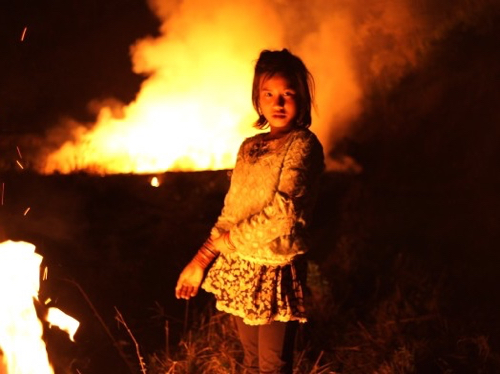
“Cinema can’t get more iconic than this, as the Ta’ang, made itinerant by war, create shelter with whatever they can find, which usually means sticks and stones. Wang watches as a group tries to build a frame for a tarpaulin roof with bamboo poles scavenged from what grows along the road. The poles tumble into a pile before any improvised structure can stand. It’s the myth of Sisyphus, in Southeast Asia. As the sounds of fighting get closer, the Ta’ang are back on the road again, marching from a camp to destinations inside China’s Yunnan province. Sometimes they harvest sugar cane, but they are essentially the walking poor. Wang’s signature contemplative shots make Fred Wiseman’s seem hurried. His extended observations remind us of a perennial truth about war. For combatants and for the refugees that Wang watches, time is experienced with long periods of inactivity and sudden bursts of urgency that force them to move immediately. It’s an odd paradox here that Wang’s camera, viewing the Ta’ang at tactile range, is remarkably steadfast, capturing moments of mothers talking, children playing, and conversations halting when artillery fire in the distance gets louder. The longer Wang looks at the Ta’ang, the more human this seemingly undifferentiated stream of refugees becomes. And the closer we get to mud, filthy bowls of rice and open streams, the more universal the images are. In the film’s deliberate pace, and in its dignified fatalism, Robert Bresson comes to mind.”
David D’Arcy1
New Left Review: But didn’t you anticipate resistance from your audience? And what were the main problems in making the film?
Wang Bing: Resistance? I never thought about such things. If you want to make a film, you have to work on it, to realize your plan from start to finish. For me, my job is to get things done. It didn’t involve much exploration of the language of presentation and representation. It was mainly the actual work, practical matters on a daily basis. I didn’t have much difficulty getting into the factories, making friends with workers, and so on. That was all quite simple. The most difficult part of filmmaking is money. You need to shoot every day, to manage a mass of details every day. The work required a continuous input of material resources. Basically my friends and my family supported me.
New Left Review in conversation with Wang Bing2
- 1David D’Arcy, “Ta’ang: Berlin Review,” Screen Daily, 1 March 2016.
- 2New Left Review, “Wang Bing: Filming a Land in Flux”

